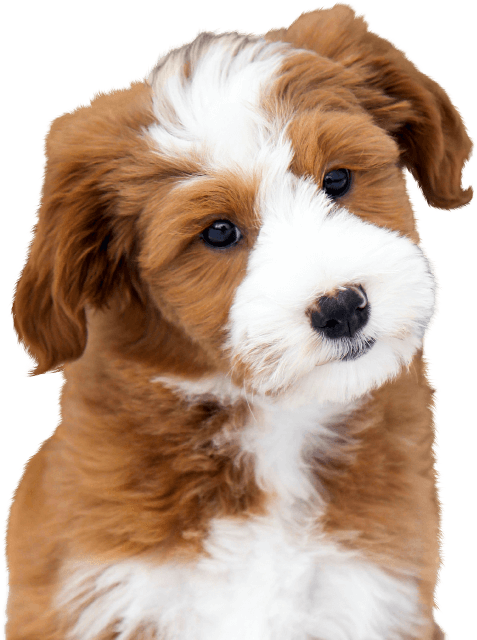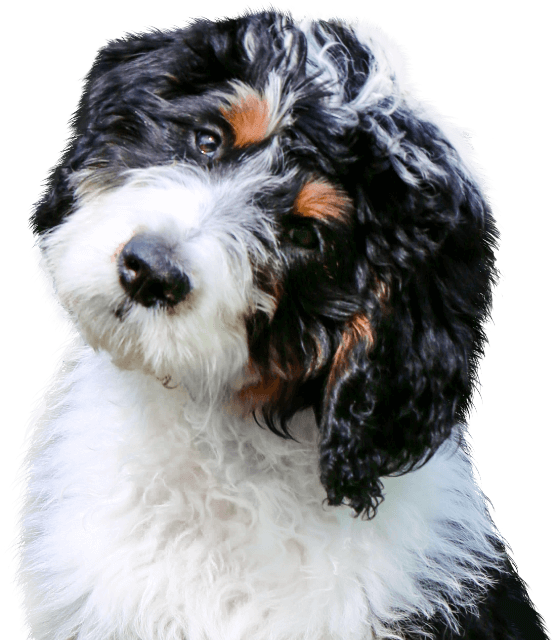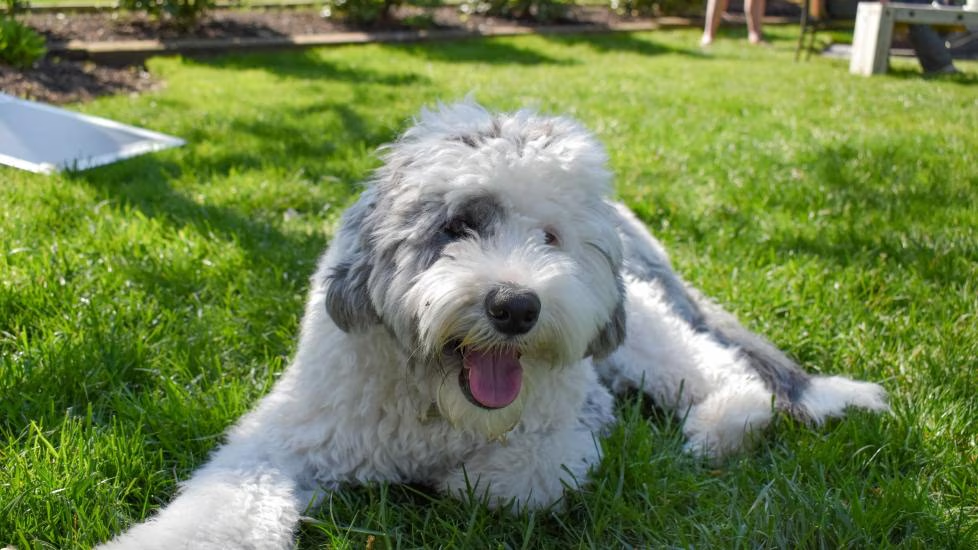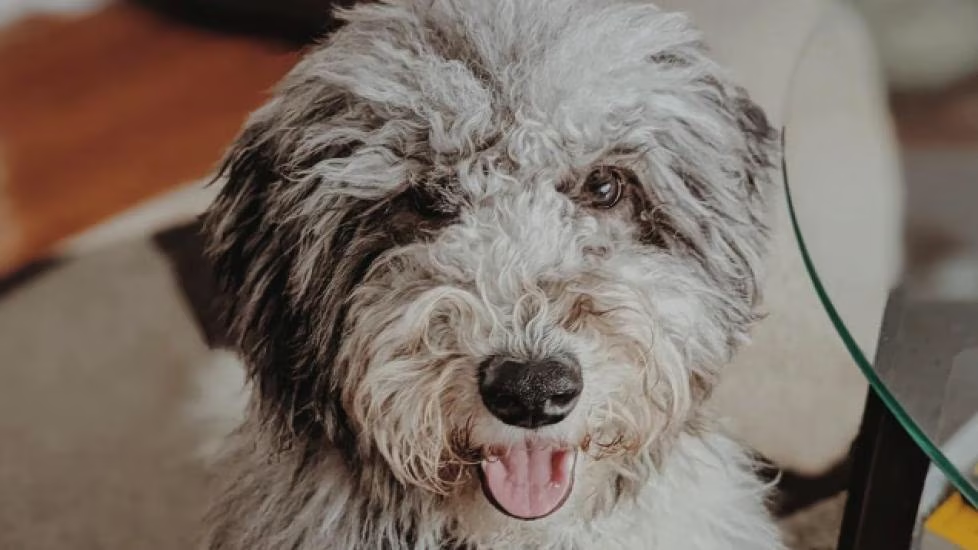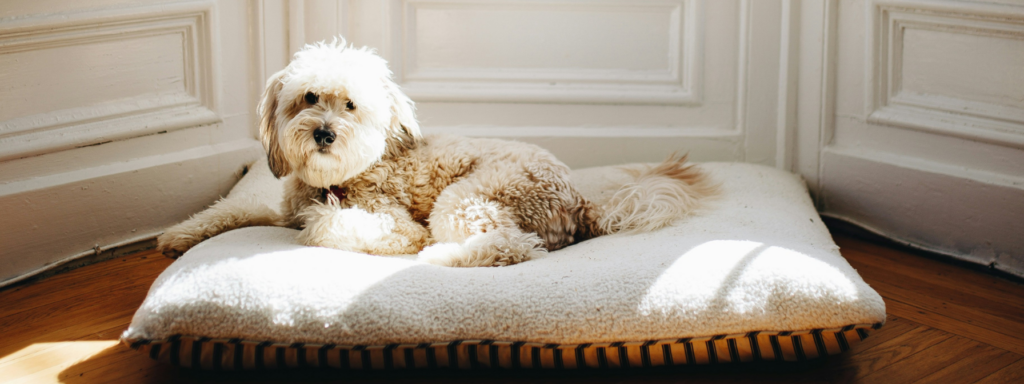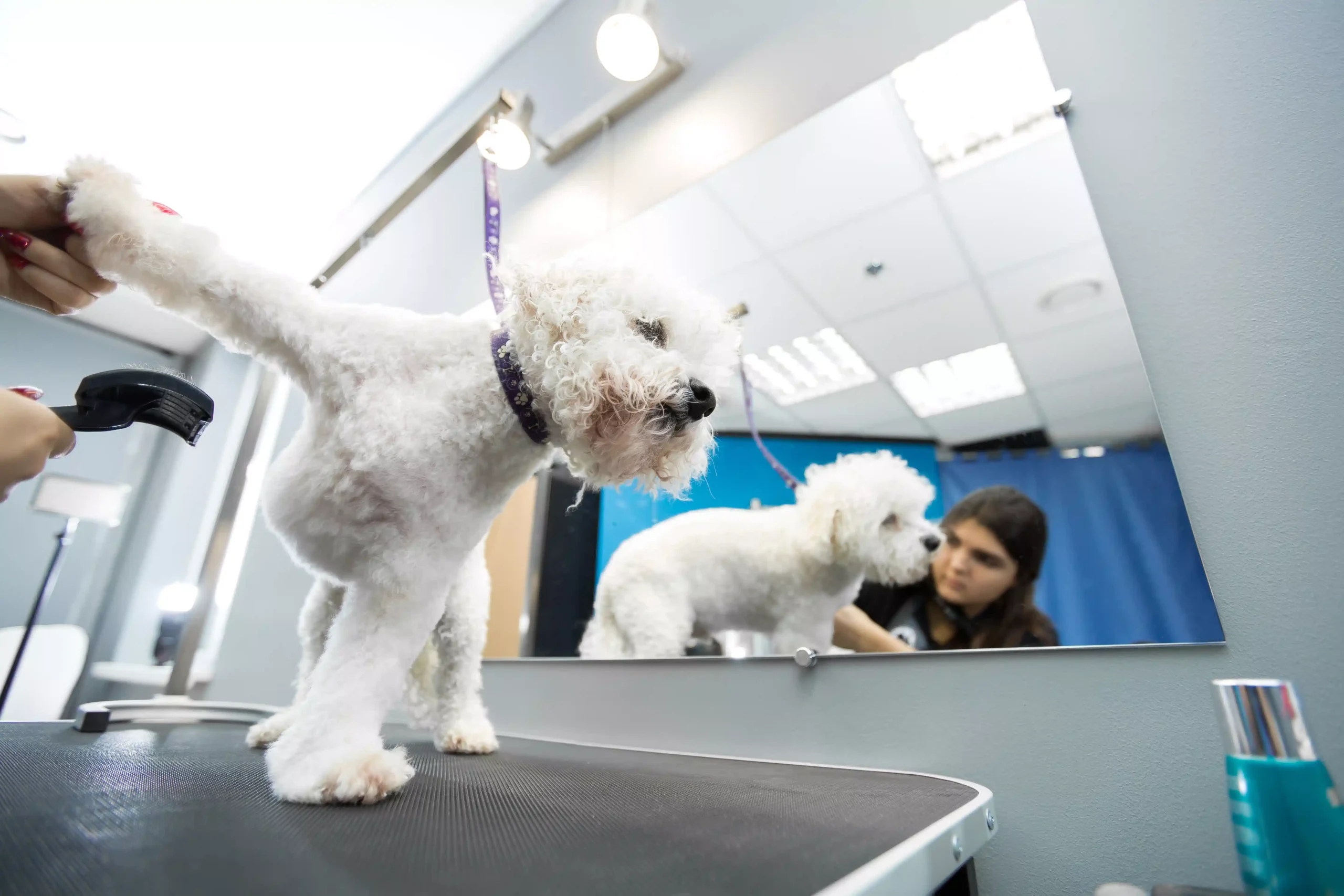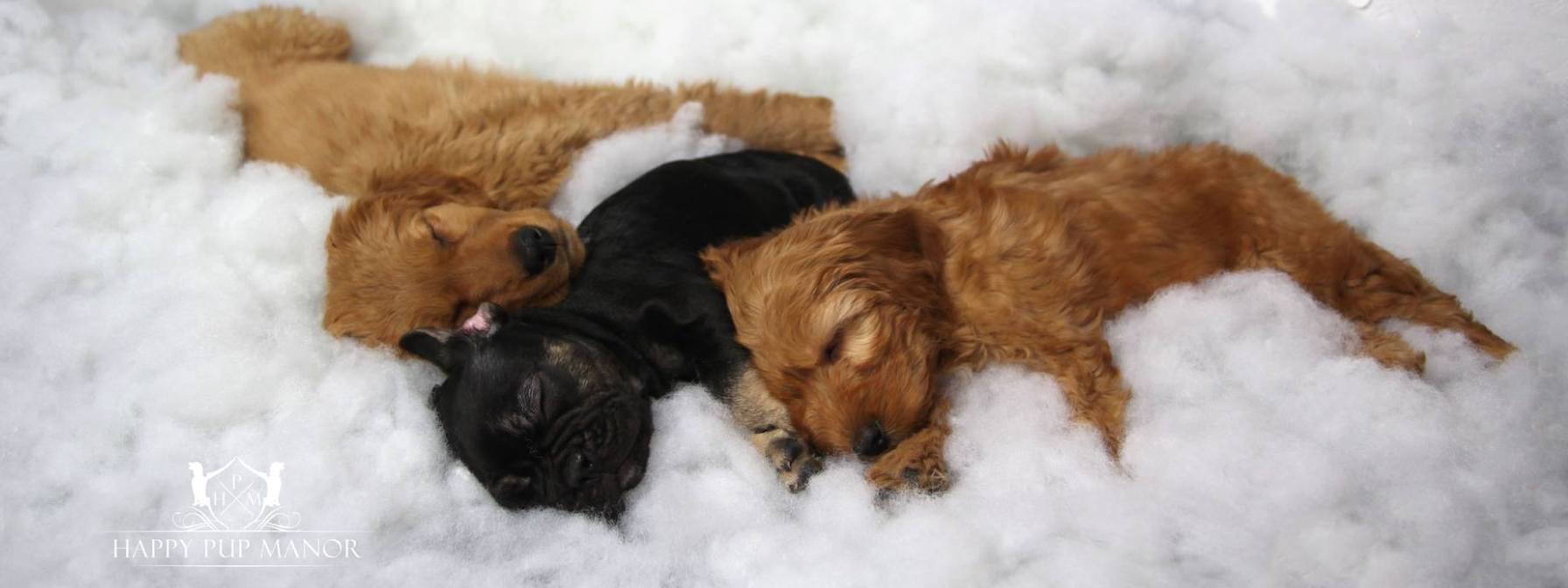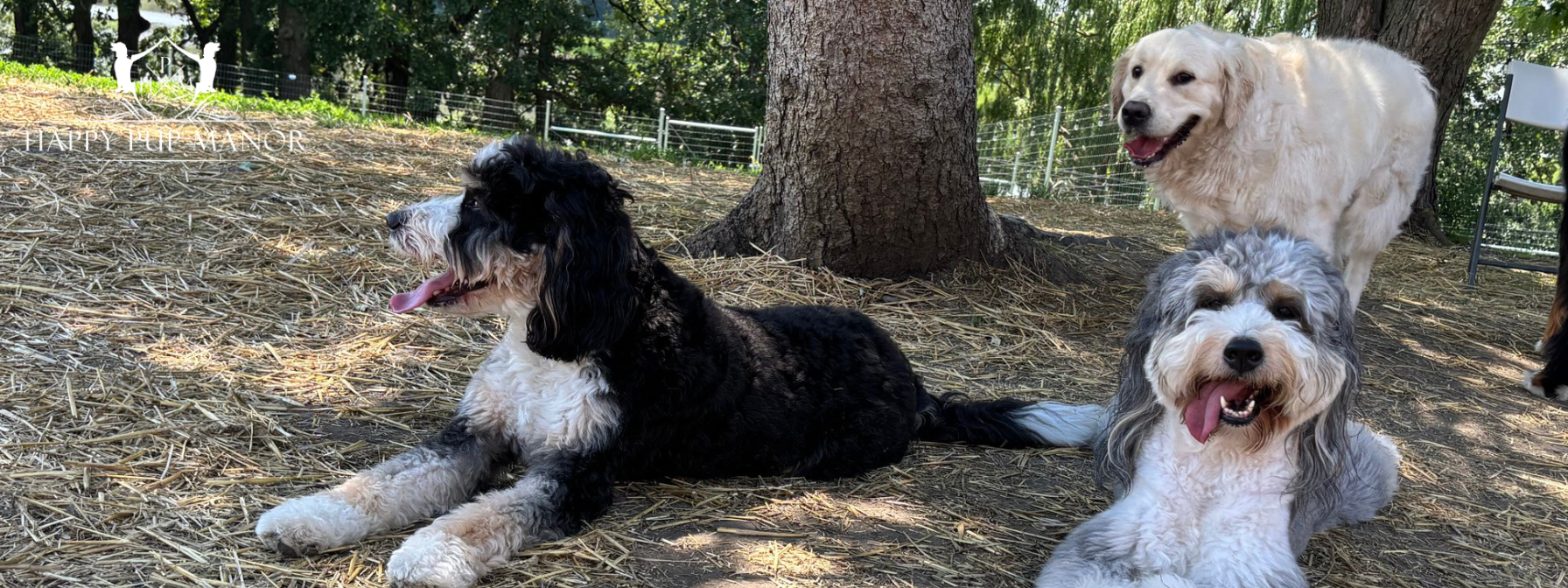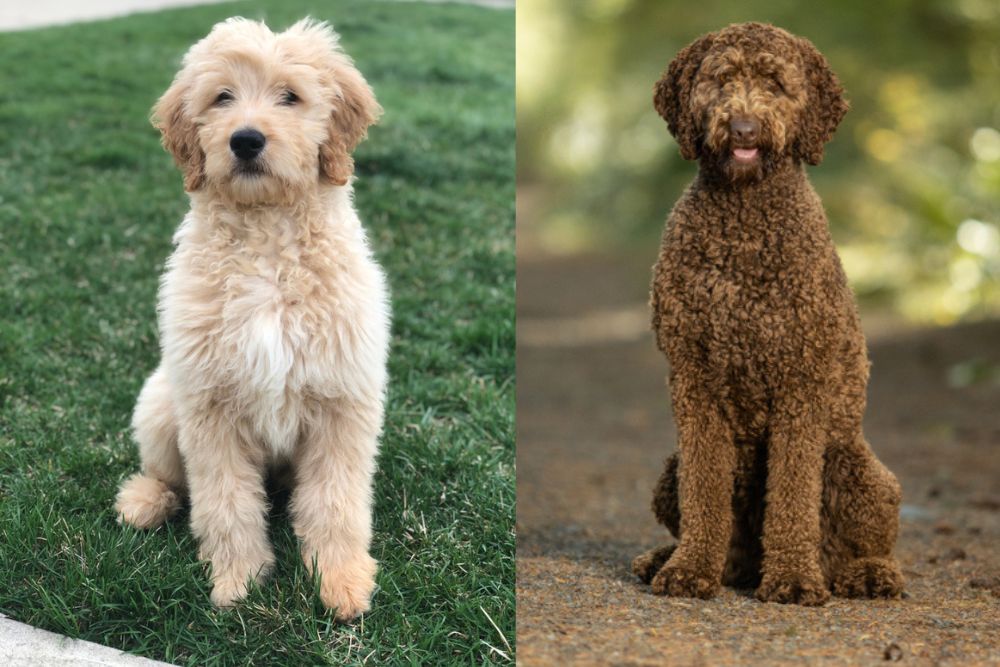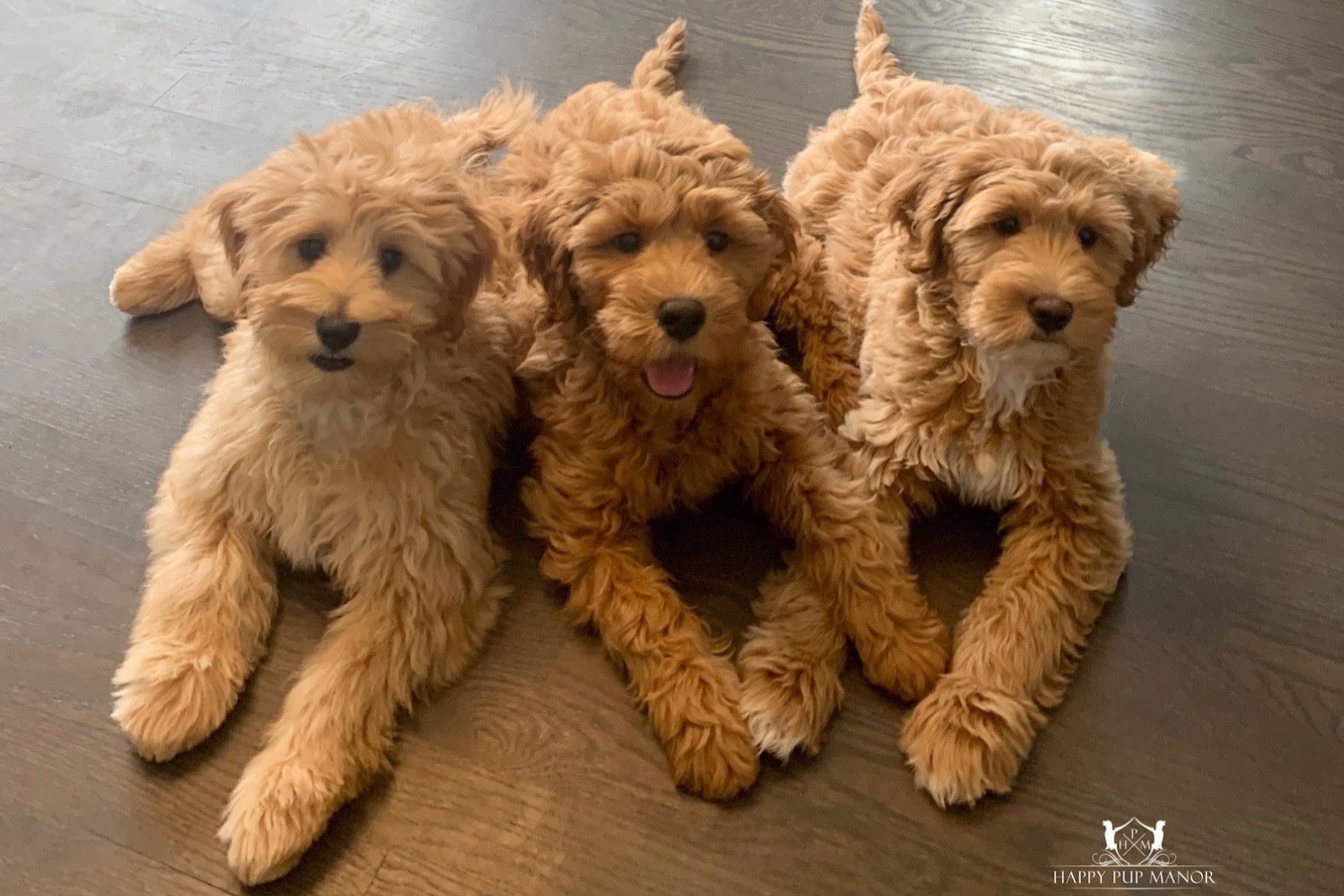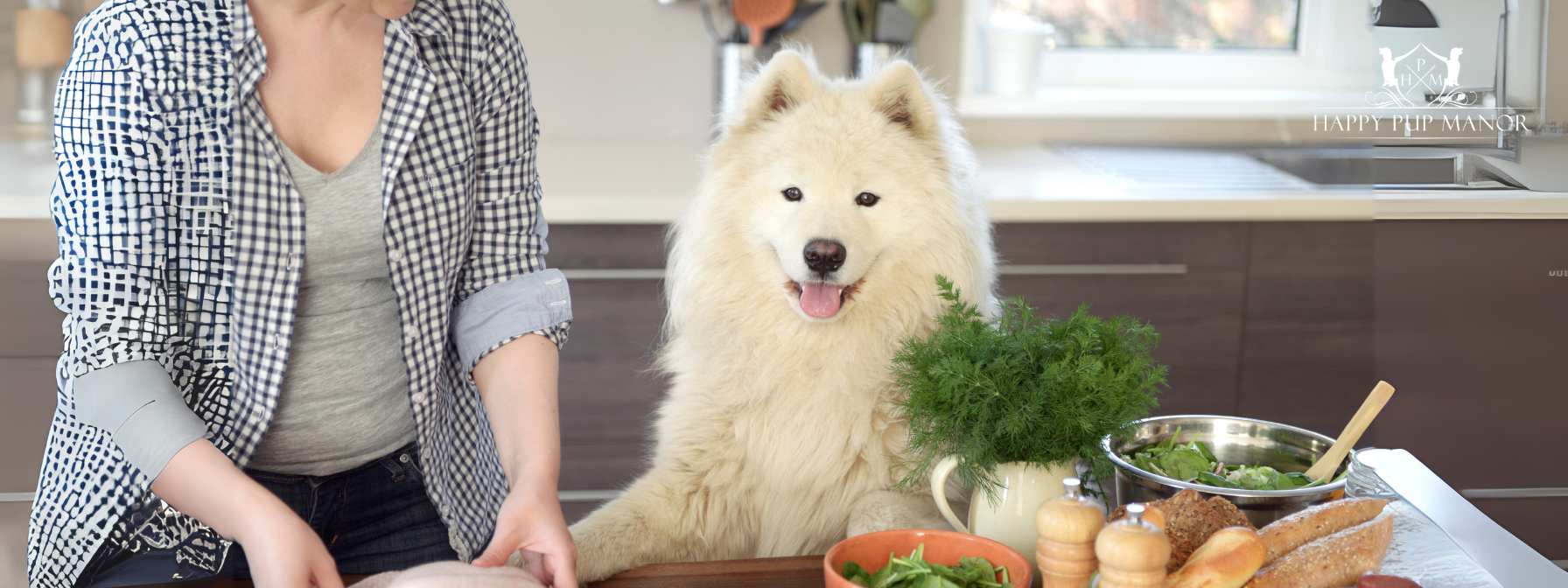Sheepadoodle vs. Whoodle: Which Doodle Is the Best Match for You?
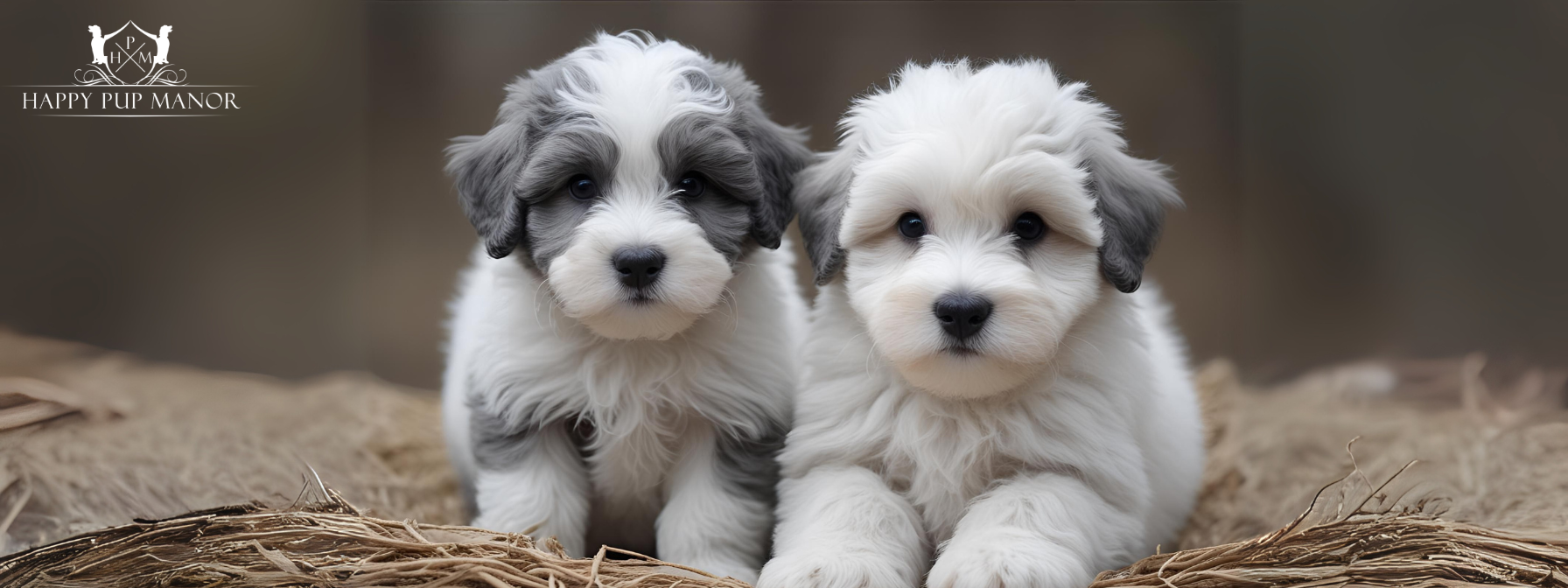
Sheepadoodle vs. Whoodle: Which Doodle Is the Best Match for You?
When it comes to choosing a Doodle breed for your family, two names often rise to the top: the Sheepadoodle and the Whoodle. Both offer a winning combination of intelligence, affection, and good looks, but they differ in energy, grooming, and temperament. At Happy Pup Manor, we understand that the perfect pup isn’t just about appearance—it’s about lifestyle compatibility.
Whether you’re captivated by the stately elegance of a Sheepadoodle or the cheerful charm of a Whoodle, this side-by-side comparison will help you determine which breed best complements your household. This comprehensive guide is designed to help you make an informed choice in the “Sheepadoodle vs. Whoodle” debate.
Breed Backgrounds & Physical Traits
Understanding a breed’s roots gives us insight into its behavior, build, and care needs. From their working-dog origins to their designer-dog popularity, the Sheepadoodle and Whoodle each bring a fascinating blend of physical traits and history that shape who they are today.
Sheepadoodle
A cross between an Old English Sheepdog and a Poodle, the Sheepadoodle was initially developed in the 1960s by the U.S. Army to serve as a service dog. Around 2007, Sheepadoodles began gaining popularity among private breeders and pet owners. By the late 2010s, they had entered the mainstream as one of the more beloved, though still somewhat rare, Doodle varieties in North America and Europe.
They usually weigh between 45 and 85 pounds and stand about 16–22 inches tall. Sheepadoodle coats range from curly to wavy, smooth or dense, with or without an undercoat. Colors include black, brown, gray, apricot, or white—either solid or in two-tone patterns. Miniature versions (with Miniature Poodle lineage) exist but are less common.
Whoodle
A mix of Soft Coated Wheaten Terrier and Poodle, the Whoodle isn’t an officially recognized breed, but it has developed a devoted fan base. Often nicknamed Wheatenpoo, Wheaten-doodle, Sweatendoodle, or Sweatenpoo, Whoodles boast a teddy bear-like appearance and a bright personality to match.
Their size depends on the type of Poodle parent: Toy (4–6 lbs), Miniature (10–15 lbs), or Standard (40–70 lbs). Mini Whoodles generally weigh 20–30 pounds; Standard Whoodles can reach up to 45 pounds. Coat texture ranges from silky to curly, and their color can span from wheat-like cream and gold to black, gray, or red.
Temperament and Disposition
Behind those lovable faces are complex personalities shaped by generations of instinct and purpose. From the Sheepadoodle’s intuitive calm to the Whoodle’s lively exuberance, understanding how these breeds behave at home, with family, and in new environments can help you decide which pup best fits your lifestyle.
Sheepadoodle
Ideally, your Sheepadoodle will be adaptable, intelligent, affectionate, and playful, exhibiting the easygoing, good-natured temperament of their Old English Sheepdog roots, while still offering the energetic fun and clownish antics of their Poodle lineage. Depending on which parent breed they take after more strongly, some Sheepadoodles may show more independence or more eagerness to please.
This breed is not necessarily high-strung, but they do have remarkable stamina. Without sufficient mental and physical stimulation, their energy can manifest as over-the-top behavior or restlessness. “It’s not so much that they’re super-high energy, but their endurance is pretty incredible.” If that energy is pent up, it can appear excessive.
Due to their affectionate and people-oriented nature, Sheepadoodles often form strong, lasting bonds with their family members. If left home alone too often, especially without engaging toys or activities, they may become anxious or unsettled. “They’re very people-oriented dogs,” and in home settings without enough to do, they may panic or become unsure of how to behave. This could result in undesirable behaviors, but with proper socialization, training, and mental stimulation, it’s less likely to be a long-term issue.
Whoodle
Whoodles are extremely intelligent, active pups that need plenty of outlets for their energy and bright minds. Like their parent breeds, the Poodle and the Soft Coated Wheaten Terrier, they thrive on close companionship and daily activity. Without enough mental or physical stimulation, Whoodles may develop unwanted habits like chewing or excessive barking.
They are fast learners with an enthusiastic, often goofy streak, and they shine in homes where their zest for life is encouraged. Their high energy can sometimes translate into rambunctiousness, so early and consistent training is important. Some Whoodles are highly food-motivated, while others respond best to praise and play. Because they are easily distracted and excitable, training sessions should be short, consistent, and positive.
As affectionate companions, Whoodles bond closely with their humans and can be prone to separation anxiety, especially if left alone without structure or entertainment. They’re best suited to families who can offer plenty of attention and stimulation. Additionally, due to the Wheaten Terrier’s prey drive, Whoodles should be gently socialized with smaller pets like cats, rabbits, or gerbils during puppyhood.
Coat Care and Grooming Needs
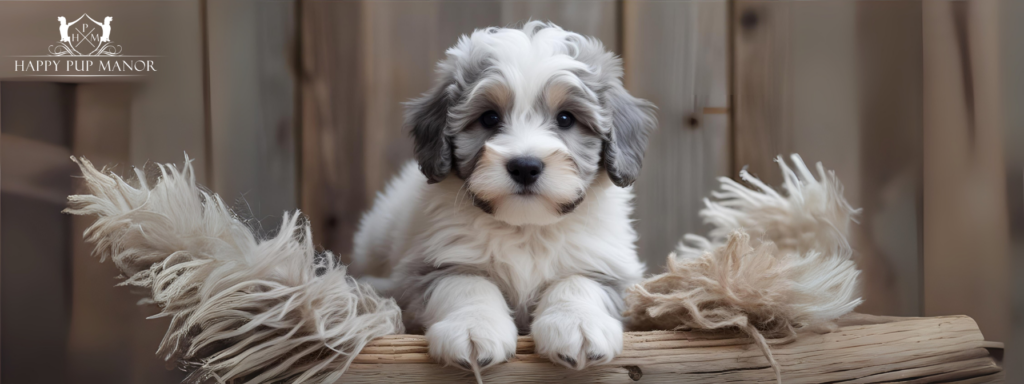
Luxurious coats may be part of the Doodle charm, but they come with serious grooming demands. Whether it’s the Sheepadoodle’s plush waves or the Whoodle’s silken curls, both breeds require attentive care to maintain coat health, prevent matting, and support overall hygiene.
Sheepadoodle
Many people choose Doodle breeds for their reputation as non-shedding or “hypoallergenic,” but it’s important to understand that no dog is truly allergen-free. Sheepadoodles may shed or not depending on their coat type, and people with allergies should spend time with the breed first to gauge sensitivity.
Thanks to their Old English Sheepdog lineage, Sheepadoodles are well-suited for cooler climates, though they can adapt to warmer regions with appropriate coat trimming and cool resting areas. Their coat, whether wavy or curly, requires significant upkeep regardless of shedding levels.
Grooming Routine:
- Brushing: Several times a week (daily is best) to prevent tangles and mats, especially around ears, legs, and tail.
- Professional Grooming: Book a full groom every 6–8 weeks to keep their coat healthy and manageable.
- Matting & Shedding: Depending on coat type, your Sheepadoodle may be more prone to seasonal shedding or matting. Consult your groomer for best practices.
- Early Grooming Habits: Introduce brushing, nail trims, and ear cleaning early. Keep sessions short and positive.
- Eye Care: Trim fur around the eyes and monitor for signs of irritation or cloudiness.
- Ear Care: Clean ears weekly, especially after water play, to prevent infections caused by trapped moisture.
Whoodle
Though they don’t shed much, Whoodles are not low-maintenance when it comes to grooming. Their soft, curly coat is prone to matting and needs thorough, daily brushing all the way to the skin. Dirt, burrs, and moisture can easily become trapped in their coat, making regular grooming essential.
Grooming Routine:
- Brushing & Coat Care: Use a comb and brush daily to prevent mats—avoid scissors when untangling, and gently work through knots with your fingers or a detangling tool.
- Professional Grooming: Schedule haircuts every 4–8 weeks. A shorter trim can make daily care more manageable.
- Skin Care: Mats can irritate the skin and harbor moisture. Bathe your Whoodle as advised by your vet, as overbathing strips the coat’s natural oils.
- Eye Care: Trim hair around the eyes to avoid discomfort and check for cloudiness or redness.
- Ear Care: Like Poodles, Whoodles may grow hair inside the ear canal. Clean ears weekly to prevent infection, and ask your vet for product recommendations.
Training and Social Development
The intelligence of both the Sheepadoodle and Whoodle shines during training—but how that plays out depends on their inherited traits and how early you begin. From housebreaking to leash manners and social confidence, this stage shapes their future behavior and strengthens the bond between you and your pup.
Sheepadoodle
As long as they’re included in what the family is doing, Sheepadoodles tend to be happy-go-lucky pups. That said, they are generally rather alert. They can be quite vocal about visitors or passersby—this behavior is instinctual, inherited from both parent breeds, and can be managed with training to help them understand when barking is or isn’t needed.
Although the Old English Sheepdog and the Poodle were bred for different jobs—herding and hunting, respectively—both breeds are highly intelligent. That intelligence shines in the Sheepadoodle, making them a clever, engaged, and motivated companion. They tend to love learning and thrive on positive reinforcement.
Pet parents should be prepared to invest time in training classes and mentally stimulating activities. Sheepadoodles enjoy having a job to do, whether it’s agility work, trick training, or canine puzzles. Some Sheepadoodles inherit the Poodle’s eager-to-please temperament and may train quickly, while others may show more of the independent streak found in the OES. Either way, consistency, patience, and encouragement are key to successful training.
Whoodle
Whoodles are bright and quick to learn, but that doesn’t mean training is always easy. While Poodles tend to be people-pleasers, Soft Coated Wheaten Terriers are known for their independent streak, so your Whoodle’s training temperament may vary.
Dogs learn the foundations of social behavior from birth to around 16 weeks of age, so early socialization is crucial. Talk to your breeder about their approach, and continue socializing your pup the moment they come home.
Because they’re both smart and spirited, Whoodles respond best to positive reinforcement methods, whether they’re food-motivated or praise-driven. Just remember that training treats contribute to daily calories, so feed accordingly.
Although they adapt well to apartment living, Whoodles need daily physical activity to stay well-behaved. They love walks, swimming, dog puzzles, and active play with their family. While they enjoy companionship, they’d rather join in the fun than sit still, and they may become anxious or destructive if left alone too long.
With patience, consistent training, and proper outlets for their energy, Whoodles develop into polite, joyful companions. Early manners training can also help reduce enthusiastic jumping and other attention-seeking behaviors.
Lifestyle Compatibility
Choosing a dog isn’t just about temperament or appearance—it’s also about how well your lifestyle matches theirs. From daily routines to household dynamics, the right fit ensures both you and your pup thrive together. Let’s look at how the Sheepadoodle and Whoodle stack up in real-life compatibility.
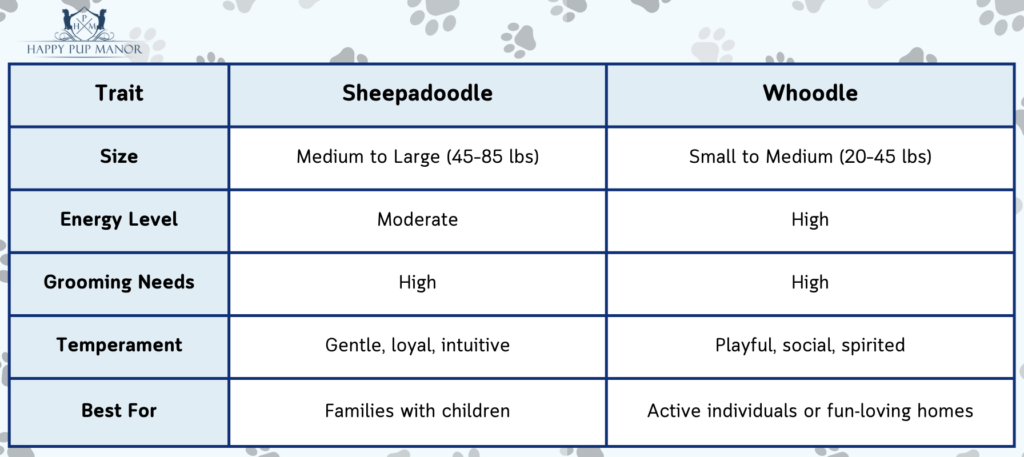
Sheepadoodle
As an Old English Sheepdog-Poodle mix, the Sheepadoodle is bred to create a dog with everything people love about both parent breeds. This leads to a clever, playful, loving dog that thrives as a cherished member of the family, but it does need to be the right family. Fortunately, because both the Poodle and the OES tend to be great family dogs, a well-socialized Sheepadoodle will likely love children and get along well with other pets with proper introductions and supervision.
Whoodle
Whoodles aren’t low-maintenance dogs. Due to their above-average intellect and energy, they do best with experienced pet parents who have the time and skills to provide consistent positive training and appropriate physical and mental exercise. They aren’t recommended for houses with small children who could get overwhelmed by the Whoodle’s enthusiasm, as Whoodles sometimes show their affection with full-body hugs (or jumping).
While Whoodles love children, their enthusiasm can be too much for very young kids to handle, especially Standard Whoodles (those with a Standard Poodle parent). Mini Whoodles may be better around small children. Supervise all interactions between kids and dogs—regardless of the breed—and teach kids how to properly interact with animals.
Common Health Considerations
Beneath their adorable coats and lovable personalities, both the Sheepadoodle and Whoodle can carry genetic health risks inherited from their parent breeds. Understanding these potential concerns can help you stay proactive with preventative care, vet checkups, and lifestyle choices that support long-term health.
Sheepadoodle
Sheepadoodles are generally a healthy breed with a typical lifespan of 12 to 15 years. However, like all dogs, they can inherit some conditions from their parent breeds—the Old English Sheepdog and the Poodle.
Common health concerns include:
- Hip Dysplasia – A joint issue that may cause stiffness, discomfort, or reduced mobility. Treatment options include supplements, medication, or surgery.
- Eye Issues – Inherited problems such as cataracts, progressive retinal atrophy (PRA), distichiasis (abnormal eyelash growth), or corneal dystrophy. Regular eye exams are recommended.
- Bloat (Gastric Dilatation-Volvulus) – A life-threatening condition common in large, deep-chested dogs. Preventive gastropexy surgery is sometimes advised during spaying/neutering.
With routine vet care, grooming, and a balanced lifestyle, most Sheepadoodles enjoy long, happy lives.
Whoodle
Whoodles generally live between 12 and 15 years, but like all breeds, they can inherit certain conditions from their Soft Coated Wheaten Terrier and Poodle lineage.
Here are a few common health concerns to know about:
- Protein-Losing Enteropathy (PLE): A condition in which proteins are lost from the intestines, most commonly seen in Soft Coated Wheaten Terriers. It’s typically managed with medication and diet.
- Protein-Losing Nephropathy (PLN): This kidney disorder results in protein loss through the urine. Though it’s not curable, it can often be managed with medication and supportive care.
- Renal Dysplasia: A congenital defect where one or both kidneys do not develop properly. Severe cases can lead to kidney failure in puppies.
- Hip Dysplasia: Seen especially in Standard Poodles, this condition can cause limping, discomfort, and limited movement. Mild cases are managed with therapy; severe cases may need surgery.
- Idiopathic Epilepsy: More common in Poodles, this neurological condition causes seizures of unknown origin. It’s usually managed with medication.
- Sebaceous Adenitis: A skin disorder found in Poodles that can lead to hair loss, odor, and scaly skin. Treatment may include medicated baths and oral medications.
- Von Willebrand Disease (vWD): A genetic blood clotting disorder common in Poodles. Dogs may bleed excessively after injury or surgery. Testing is recommended before any procedures.
Regular veterinary visits, health screening, and a healthy diet can go a long way in managing or preventing these conditions.
Which Doodle Belongs in Your Family?
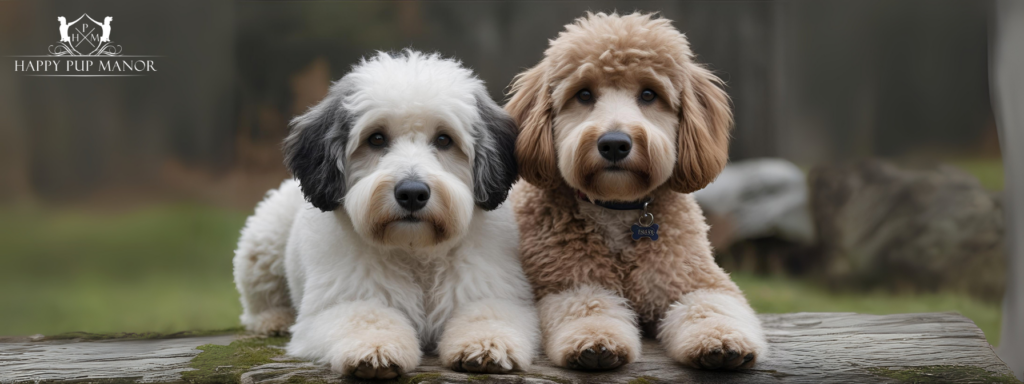
If you’re searching for a loyal, mellow dog with a strong desire to please, a gentle nature around children, and a calm yet playful disposition, the Sheepadoodle may be your ideal match. This devoted companion thrives in structured, affectionate homes and enjoys being part of a close-knit family routine.
On the other paw, if you’re looking for a spirited, outgoing pup with a dash of mischief and a love for fun-filled adventures, the Whoodle brings an energizing presence into the household. With their sharp wit and affection for attention, Whoodles are perfect for active owners who enjoy daily walks, games, and lots of engagement.
Let Happy Pup Manor Help You Welcome Your Perfect Doodle!
At Happy Pup Manor, we specialize in understanding and training Sheepadoodles, Whoodles, and other beloved Doodle breeds. Each pup has a personality as unique as their curls, and they deserve care tailored just for them. Whether you’re welcoming a new puppy or elevating the routine of a beloved companion, our luxurious training and boarding services are designed to meet their needs—and exceed your expectations.
Considering bringing home a Sheepadoodle or Whoodle? Contact us oday to learn how we can support your dog’s success and happiness!
